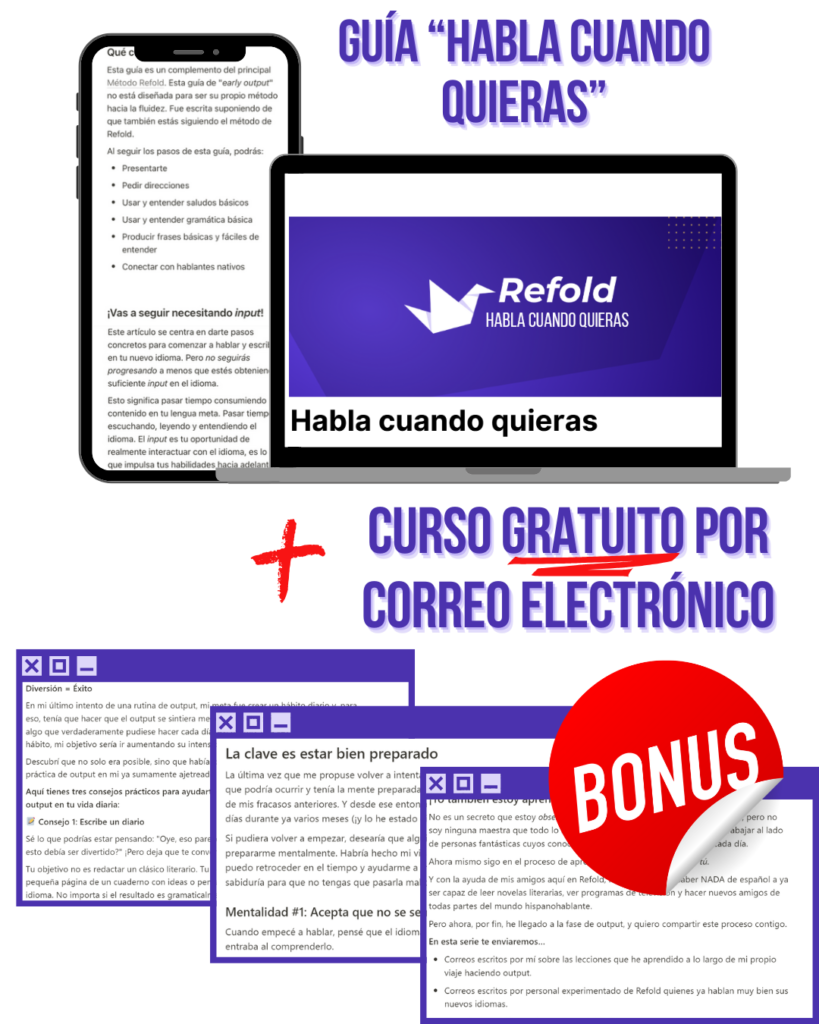Welcome!
Ask any seasoned immersion learner, and they will have a wealth of knowledge on almost any aspect of the process that you can think of. However, with that wisdom and experience also comes a loss of perspective on what a new immersion learner struggles with. The process of language acquisition isn’t just about what YouTuber to watch or what vocabulary to learn. There are underlying skills that need to be cultivated and mindset shifts that need to take place for someone new, on top of trying to make sense of a foreign language.
I have been learning Japanese with Refold for almost a year now, and I spend a lot of time interacting with new learners and guiding them. Through these numerous experiences, I have organized some tips to share. The goal of this is to be motivating and encouraging, but also, some of this advice will not be what you want to hear. But you need to hear it.
1. Be Patient and Set Low-Pressure Goals

If you have tried to learn a language in the past, you are more than likely familiar with the traditional method. What I mean by this is, cramming vocabulary lists and drilling grammar with little to no contact with the language itself. One of the main reasons traditional methods have survived for so long (among many others) is that they provide instant gratification. Hearing an uplifting chime sound in your mobile app (that may or may not involve a green owl mascot) whenever you correctly answer a question is an example of this. You get instant, positive feedback from your efforts. And, by extension, you feel a tangible sense of progress. That pesky question that was giving you trouble yesterday is a breeze today.
In addition, study materials, such as textbooks, are often watered down. They are intentionally made to be easy and digestible. They are an artificial version of the real language. Breaking up natural languages this way is much more palatable to the average person. If you set the bar very low to begin with, almost anyone will clear it.
But if you stop to think about it, isn’t this a little insulting? Textbooks and apps will basically drip-feed you the language in tiny, bite-sized chunks. It makes you feel good as a beginner, but it’s almost like being sheltered your whole life and being shocked when you try to interact in the real world.
Input-based methods don’t offer such a gentle welcome. It is scary. It will feel as if you are being thrown into the ocean without land in sight. However, you will come out of the experience with an excellent tan, and more knowledge on how to swim than most people you will talk to.
What I’m trying to say with my bad analogy is that your efforts will pay off. You won’t be getting instant positive feedback from a mobile app. But you will get something much more rewarding instead. You will be the most prepared out of your peers if you were to find yourself in a situation where you need to communicate with others in your target language. Struggling a little in the beginning means you don’t have to struggle later when it really matters.
All that being said, you will not notice instant progress. Your rate of progress will depend on many factors, including your target language itself, and how much time you can spend getting input per day. This language acquisition process is unconscious and difficult to notice from the outside. In this way, it’s similar to growing taller during that specific period of your life. You will not notice a drastic change day to day. However, when you look back over a period of weeks, months, and years, the changes will be clear as day.
That’s not to say you won’t notice progress at all. You will. It just won’t be on day 1, day 2, or even day 7. Be patient and don’t expect too much from yourself in a short period of time.
2. Be Prepared For Your Goals To Change

Goals are not a bad thing to have. In fact, they are great things to have. They can act as an important anchor in this confusing sea known as immersion learning.
However, after spending some time here, you will naturally become a much stronger swimmer. As a beginner, it’s a good idea to set your expectations low. “I just want to be able to hold my breath for 30 seconds,” you think to yourself.
As great as that is, don’t hold onto these low-bar goals if they are holding you back. An example of a low bar goal is aiming to pass the lowest level of a certified language proficiency test for your target language. Spending just a year immersing in your target language for at least 1 hour per day will more than likely rocket you way past this goal. Don’t hold yourself back. You should adjust and revise your goals as you progress further.
Whether it’s expecting too much too quickly, or holding onto low expectations, don’t be your own enemy. You already have enough to worry about throughout this process without getting in your own way.
3. You Don’t Know As Much As You Think

Looking at this heading, you are probably expecting me to finally roast you and tell you that your 4 years of German in University didn’t matter. It was a complete waste of your time, and you don’t actually know anything.
I’m going to take this in a different direction, though.
I would compare the average traditional learner and the average immersion learner to a sprinter and a marathon runner, respectively.
A sprinter and a marathon runner are both good at what they do, but they have very different skill sets and training.
A traditional learner is very good at packing in tons of information in short bursts very quickly through brute force and rote memorization. However, they will choke if you push them past their comfort zone.
An immersion learner isn’t built for speed, but for endurance. They are also all about internalizing large amounts of information over a longer period of time. It will not be as fast as the traditional learner, but it will stick for the long term, and they will be able to learn much larger quantities of information in general than the traditional learner.
Both of these types of learners have their merits. But if you’re reading this, I’m going to guess that you’re looking for something more sustainable than the short burst, brute force method.
In this case, just as if you are transitioning from sprinting to marathon running, you will need to adapt your strategy. Some knowledge and skills may carry over, but generally, you will need to forget everything you know and embrace your new training routine.
So, your 4 years of German in University isn’t completely useless, but you will need to come to accept that you don’t know everything. You won’t know a lot, actually. Be open-minded and humble yourself as if you are a beginner all over again.
4. Don’t Make the Flashcard More Important Than It Actually Is

Coming from a traditional learning mindset, a lot of importance is put on flashcards. Whether you make them the old school way with paper or make digital ones, failure when reviewing flashcards is a negative reflection of your effort and intelligence. Because after all, how else will you learn this information? If you can’t remember the answers to your flashcards, what else is there?
In immersion learning methods, flashcards (using a Spaced Repetition System, SRS), really take more of a backseat in the process. This can be a difficult concept to grasp when you’re new. The reason for this is that the flashcards are not the entire method. Far from it. The core of the method is, well, immersion. Watching content that is engaging for you and hearing certain words repeat is much more effective than any flashcard. This also gives you a much more intuitive understanding of vocabulary through context, similar to natives of that language. This is also something that you simply cannot achieve with flashcards on their own.
Using immersion methods, your flashcards are more of a primer. Much like when your friend is telling you they bought a yellow car, you will start to notice more yellow cars on the road while driving. This is how the SRS works. You are simply being told what to look for, and let your immersion take care of the rest. There is no such thing as failure. Even if you answer incorrectly in your SRS, you will still continue to see those words, and you will still learn them. It literally doesn’t matter, even if you were to fail every single card in your deck. Let go of the need to get all the right answers when reviewing flashcards.
5. Be Self-Sufficient

When we think of learning, we almost expect to have a teacher, or someone just as knowledgeable telling us what to do, how to do it, and giving us feedback. We wait for the knowledge to come to us. Or we ask for it, and we instantly get it.
This is not how immersion learning works, and it would benefit you to come to terms with that quickly. See what we said about the difference between teaching and coaching.
Unlike other skills such as changing a tire or painting a picture, we cannot tell you the language and have you understand. Language acquisition simply doesn’t work the way other skills do. It requires a lot of self-reflection, a lot of motivation, and a lot of being okay with not knowing the answer right away. If you are constantly spoon-fed, you will never build the confidence to feed yourself. A large part of being a successful immersion learner is learning how to be self-sufficient.
Do your own research, read guides, read FAQs. Almost all of your questions will be answered by simply reading the large amounts of resources that have been written specifically for you and others like you.
In this confusing time, you will probably feel alone and isolated. You may feel that no one understands, or no one else has gone through what you’re going through. But your struggles as a beginner are not unique. In the immersion learning process, everyone will go through many phases. And as surely as the phases of the moon, you will go through it too, just like everyone before you has. You are not the first. Take advantage of the knowledge that has come before you.
If you’re still struggling, we are here to help you. But you need to try to find your own answers first. And sometimes the only answer to your problem is to immerse more. You need to make peace with this.
Good luck!
Like what you see?
Sign up now and we'll deliver even MORE amazing content like this right to your inbox!
- Receive our exclusive 6 SECRETS to language learning success email course.
- Stay motivated with weekly emails overflowing with helpful language-learning tips, tutorials, and more!
- Get behind the scenes access into the inner workings of Refold!








